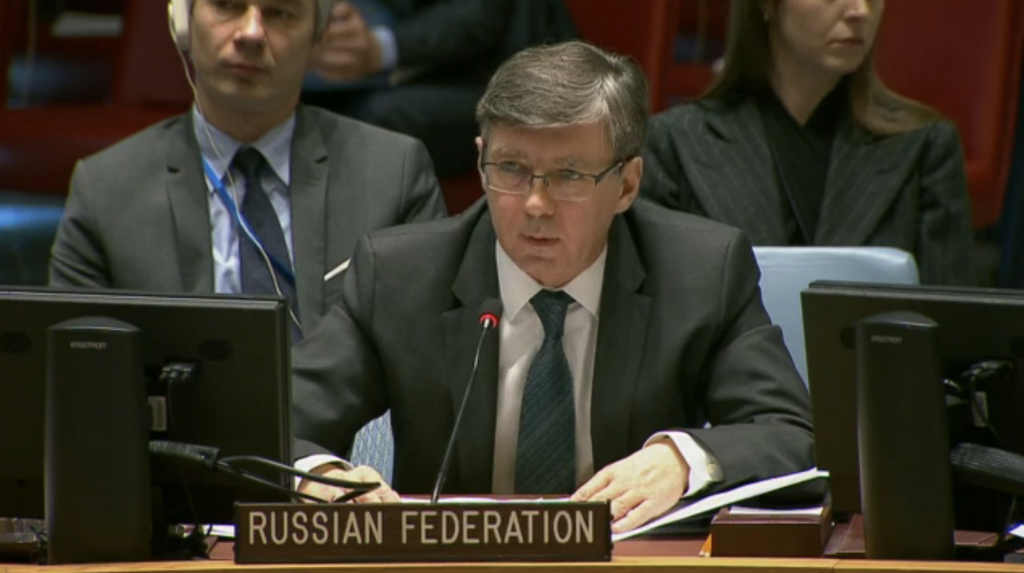Statement by Deputy Permanent Representative of the Russian Federation to the United Nations Mr. Evgeniy Zagaynov at the UN Security Council on trafficking in persons in conflict situations
Since it so happens that today we have been given the floor immediately after the Ukrainian delegation, we would like to begin by once again repudiating the insinuations made about Russia as inappropriate, unfounded and perhaps even absurd. And now let me turn to the topic of today’s meeting.
We would first like to thank the Secretary-General, the Executive Director of the United Nations Office on Drugs and Crime, the Special Rapporteur on trafficking in persons, especially women and children, and the Commissioner for Peace and Security of the African Union for their substantive presentations and assessments of the threat of human trafficking in situations of conflict.
The topic of today’s meeting is not a new one for the Council, which has dedicated resolution 2331 (2016) and presidential statement S/PRST/2015/25, adopted in December 2015, to it. The problems treated in those documents remain urgent. Considering the transnational nature of crimes related to the trafficking of persons in conflict situations, international cooperation in combating them is becoming more and more essential.
Such cooperation should be based on recognizing the interrelationship between trafficking in persons and the persistent imbalances between the socioeconomic development of various States and regions, the increasing illegal migration flows around the world and the activities of international organized criminal associations. The best way to effectively combat human trafficking is by taking an integrated approach to the problem that includes prevention, the criminal prosecution of perpetrators and assistance to their victims.
The issue of human trafficking’s links to terrorism and its financing is a specific and separate problem. We urge everyone to work more actively to fight this nexus, including by strengthen cooperation in exposing and prosecuting those involved. It is important to use all the available tools in order to suppress such activity, and we support strengthening the mechanisms for combating trafficking in human beings through various United Nations platforms as well as other global and regional formats.
Our country is a party to the United Nations Convention against Transnational Organized Crime and its Protocol to Prevent, Suppress and Punish Trafficking in Persons, Especially Women and Children and a member of the Group of Friends United against Human Trafficking.
We consider the leading role of the United Nations in consolidating international and national bodies’ efforts to combat trafficking in human beings very important, and we welcome the measures taken in this direction through the United Nations Office on Drugs and Crime, especially for giving specialized assistance to interested States.
We believe that such work deserves support, and we plan to continue to contribute to it. We firmly believe in the importance of further developing the capacity of the Inter-Agency Coordination Group against Trafficking in Persons and its member organizations’ active participation in implementing the United Nations Global Plan of Action to Combat Trafficking in Human Beings. We consider it a key reference point for directing States’ efforts in this area.
In that regard, we welcomed the General Assembly’s adoption in September of resolution 72/1, on the political declaration on the implementation of the Global Plan of Action.
We believe that the approaches that have been agreed on in the United Nations to combating trafficking in human beings constitute a solid basis for cooperation on the issue. We should therefore adopt a cautious attitude to attempts to modify or formulate alternative platforms in this area, so as to avoid misunderstanding or weakening the international anti-trafficking regime.
In conclusion, we would once again like to emphasize that in order to avoid duplicating efforts in combating human trafficking it is crucial to strictly follow the terms of reference established by United Nations bodies. In that way, it is appropriate for the Security Council to consider issues of human trafficking only in relation to the issues on its agenda. A
s we understand it, one can address that issue in the context of specific conflict situations, each of which has its own particular features, and of efforts to curtial the financing of terrorism.
